- Home
- Tamara Leigh
Baron of Blackwood Page 2
Baron of Blackwood Read online
Page 2
I assure you, Quintin’s brother had said, one Verdun wife was enough to last me unto death.
Setting her chin higher, she called, “I would put myself through with a blade ere delivering myself unto one such as you, Baron de Arell.”
He lost his smile, gained a frown. Yet she sensed he was more amused than dismayed. “Then as difficult as it is to believe of The Boursier, one must conclude he has decided ’tis better to forfeit his lands than wed a wee De Arell lass.”
Now, before all, he not only scorned the name by which others esteemed her brother for his skill at arms, but questioned Bayard’s prowess.
Quintin did not realize how quickly her breath came and went until Sir Victor leaned near. “Pray, my lady, let us withdraw that we may discuss the best course.”
“This is the only course,” she hissed and once more raised her voice up Castle Mathe’s walls. “Release my brother, Baron de Arell, else not only will you forfeit your lands when the king learns of your treachery, but your life.”
He gave a bark of laughter. “Then your brother has fled.”
“He has not. As well you know, he was stolen from his bed. Now release him!”
To her amazement, he lifted what looked like an apple, paused, and called out, “Forgive me, but your arrival interrupted my dinner.” He took a bite.
Realizing how far her jaw had descended, Quintin snapped it up.
Griffin de Arell chewed, nodded. “Were it true I held your brother, Lady Quintin, I might seriously consider releasing him—for you. But, alas, he is not inside my walls.”
Ignoring what was made to sound like flattery, she said, “I would see for myself.”
“My word I give.”
Something in his tone tempted her to believe him, but that would require she accept what she could not—that Bayard could be dead, whether by De Arell’s hand or another’s.
“Your word I do not trust,” she said and winced at the fear in her voice.
Though he had raised the apple for another bite, he lowered it. “Methinks this bears closer discussion, Lady Quintin. I shall come out to you.”
Why? Because she had revealed vulnerability from which he hoped to benefit? Before she could think how to respond, he went from sight.
“I do not like this, my lady.”
She looked around. “We are nearer to retrieving my brother, Sir Victor.”
“I am not certain De Arell holds him.”
“I believe he does. Thus, even if I have to be a woman to his man, I will make a way in.” In spite of her short hair and, when riled, an inclination to speak as she wished to speak, she knew how to work her wiles. Providing she could hide from Griffin de Arell how much he repulsed her, she would tie him in a knot she would loosen only when he yielded what she required.
Or so I pray, she sent heavenward, and wished she had not said she would rather put herself through than deliver herself as his bride.
At the sound of her entourage advancing, doubtless signaled forward by Sir Victor, she said, “Send them back.” Not only might De Arell decide against leaving the safety of his walls, but the men could prove too tempting a target for the archers.
“Nay,” the knight said. “Ere long, I may once more answer to your brother, and that day I fear more than this.”
“But—”
The drawbridge chains let out, and she caught her breath for fear the great planked beast would grind to a halt before returning to its upright position. It did not, though Godsmere’s knights and men-at-arms reined in behind her.
The top of the portcullis came into view, and beyond its crossed iron bars she saw the buildings in the outer bailey, next the garrison. But it was the blond head and broad shoulders of the man striding—not riding—past the others that held her attention.
Surely he did not intend to leave his walls on foot? But as the drawbridge thumped to the ground, Griffin de Arell halted before the portcullis and it began to rise. When it was at waist level, he did not duck beneath so it might sooner lower and secure the castle entrance. And when his head easily cleared and he strode forward, the grating did not drop behind him. Of course, his archers did have Godsmere’s men sighted down their arrows.
As the baron advanced, his eyes—were they the same intense blue as his brother’s?—moved over Quintin’s entourage, and she knew he measured Godsmere’s men against the risk he took.
If he wore chain mail, she could not detect the metallic ring, nor the flash of silver links as she considered his black mantle that parted with each stride. All she glimpsed was a dark green tunic above black boots.
He was a bigger man than his brother, Serle, but not of fat—of large bones and thickly muscled like Bayard. And the nearer he came, the more she begrudged the appeal of him. His face too rough-hewn to be handsome, its weathered skin and several days’ growth of beard making him appear older than the thirty and four years she knew him to be, he was still attractive, this man whose half-noble daughter was to have been Bayard’s wife.
“Is to be,” she whispered as her heart lurched over the slip of her thoughts. Bayard was at Castle Mathe and would wed before the deadline to preserve his family’s lands.
The Baron of Blackwood halted before the drawbridge’s threshold, less than twenty feet from his uninvited guests. Still he held the apple, and it looked more than half eaten, as if crossing from the gatehouse roof to the drawbridge had been but a leisurely stroll.
But if that was so, it was no more. He surveyed Sir Victor long and hard before shifting his regard to Quintin.
As she returned his scrutiny, the miserly sunlight reaching through the clouds revealed the hair at his crown was darker than that below. A sign he was often out of doors, just as the tanned skin of his face told.
“You may approach, Lady Quintin,” he startled her.
Resenting the sudden heat in her chilled cheeks, hoping it was not as visible as it was felt, she urged her mount forward and Sir Victor followed.
One side of Griffin de Arell’s mouth lifted, and he said dryly, “And you as well…Sir Victor, is it not?”
Quintin was momentarily taken aback, but it followed that just as Bayard knew the names of his enemy’s most esteemed warriors, so would De Arell know those of Godsmere.
“It is,” Sir Victor said and reined in five feet from the drawbridge.
Quintin did the same. Looking close upon her enemy, she was relieved that just as he did not mirror his brother’s slighter figure, neither did his features—excepting the color of his eyes, a remarkable blue that dragged her back years to when she had hurtled herself between Serle de Arell and Bayard.
“So you believe I hold your brother, that I seek to deny him my daughter, thereby causing him to forfeit,” Griffin de Arell returned her to the present where she found her fist pressed to her abdomen.
Tasting bile, she moved her hand to the Wulfrith dagger. “I do. Unfortunately, as evidenced by the history between our families, the word you give holds no meaning for the Boursiers.”
“I grant that.”
He did? She moistened her lips, and his gaze flicked to them—as expected. “Thus, I require proof you do not hold the Baron of Godsmere.”
His lids narrowed, brow grooved.
“If what you tell is true, you can have no objection to me entering your walls, Baron de Arell.”
“I can. And I do.” He looked to Sir Victor. “However, to prove your lady’s brother is not within and afterward invite her to my table, you would entrust her to me?”
“I would not!” It was said with more indignation than Quintin could remember hearing from the self-possessed knight. “Where she goes, I go, accompanied by a sufficient number of Godsmere men to defend her if needs be.”
“Should I honor Lady Quintin’s request and she observes the rules, I vow she will depart Castle Mathe the same as she enters.”
While Quintin pondered what rules those might be, Sir Victor said, “As my lady has told, your word carries no weight with the B
oursiers or those who serve them.”
The baron exhaled a breath that drifted toward Quintin. “For your sake I tried, my lady, but it appears we are at a place from which neither party can be moved.”
“We are not.” She urged her mount forward, heard Sir Victor curse beneath his breath, and felt his arm brush hers. He caught her reins, but not before her horse’s muzzle was a foot from Baron de Arell.
“A dozen escort.” She asked for more than was needed. “Allow me a dozen, and we can move from this place.”
He peered up at her, and she nearly winced at the perceived advantage she had that would not endear her to him. But then he stepped forward and, out of the corner of her eye, she saw Sir Victor close his hand around his sword hilt. And knew those behind did the same.
“Do not, Sir Knight!” Baron de Arell growled, once more causing the hairs across her limbs to stand, then he glanced behind at his archers. “At such close range, their arrows easily pierce armor.”
She was to fault for that. When her brother’s knight slid his gaze to her, she shook her head. He did not draw his sword, but neither did he remove his hand from it.
The Baron of Blackwood raised his own hands to show they were empty save for the half-eaten apple, then he parted his mantle, confirming he wore no chain mail over his tunic. There was, however, a great sword there. “Precaution only,” he said. “No harm do I intend your lady.” As the mantle resettled around him, he gripped the bridle of Quintin’s mount. “A fine horse.” Eyes that had been flint-hard once more gleamed with amusement. “Though methinks too tame for a Boursier.”
She agreed, having pressed Bayard for a stallion, and for a moment felt kindly toward the baron.
Fool, she silently rebuked. Were she the one to wed into the De Arells, this man would not gift her a worthy mount. As his wife, a mare would remain her lot. He merely baited her.
After feeding the remains of his apple to her horse, he patted the animal’s jaw and said, “Six men.”
Though certain that would be enough, he must be made to feel she wanted more so his win would seem sweeter. “Ten, Baron de Arell.”
“Six.”
“Eight.”
He released her mare’s bridle and turned.
“Six!” she blurted.
“My lady!” Sir Victor exclaimed.
Griffin de Arell came back around, inclined his head. “Choose whomever you wish.”
She looked to her brother’s knight. “I leave it to you.”
He muttered something, then summoned five of Godsmere’s best men.
Wishing her personal guard were among them—Rollo, who had been called home to tend his ailing mother—she gripped the Wulfrith dagger beneath her mantle. If Sir Victor and the other knights could not keep her safe, she would see to it herself.
She guided her horse onto the drawbridge alongside Sir Victor, and when she drew even with the Baron of Blackwood, he turned and walked beside her.
“Methinks we are both pleased with our compromise,” he said. When she shot her gaze to him, he added, “Though I would have allowed you a dozen men were it required to assuage your fear.”
“Fear?” she scorned, and wished she had not. She ought to be charming him, not making her dislike better known.
As they neared the portcullis, she looked up at the archers. “For one who expected his future son-in-law, you make an unconvincing show of welcome.”
“None was intended.”
She frowned.
“I knew it was not Baron Boursier who rode on Castle Mathe, my lady.”
“How did you come by that?”
He did not answer until they entered the outer bailey. “Just as I am easily picked from among my men, so is your brother by his size and the red in his hair. Too, though I would not be averse to Baron Boursier so fearing me that he deemed it necessary to bring a great number of armed men to his wedding, he does not.”
Once Quintin and her escort were inside the outer bailey, the portcullis lowered, cutting them off from the greater body of Godsmere men.
“You will leave your mounts here,” Griffin de Arell announced to her escort, then reached up and closed a hand over her reins and her gloved fingers that held them.
It was not flesh-to-flesh contact, but a peculiar sensation moved through her, so warm, languorous, and deep she did not attempt to correct his trespass—though she knew she should. And she met his gaze, though she knew she should not.
“I thought so,” he said low. Eyes a darker blue than they had appeared outside the walls, he drew a thumb across her knuckles. “Yet another reason I would not have my daughter wed your brother.”
Did he insinuate marriage between the houses of De Arell and Boursier be made through himself and her? Had her wiles worked that quickly? Or was she the one to fall victim to them?
That last freeing her from whatever hold he had on her, she snatched her fingers from his, twisted opposite, and dismounted from the wrong side. The mare did not like it, whinnying and sidestepping so sharply that had De Arell not brought the horse under control, she might have trod upon her mistress.
But Quintin would not thank the baron who was the cause of her unseemly dismount.
As she tugged her mantle into place, ignoring the curious looks angled at her by the men of Godsmere and Blackwood, De Arell came around the mare. “It seems I overestimated your ability to handle a horse,” he said. “Indeed, this one may not be tame enough.”
Closing her hands into fists, she said, “I await proof my brother is not at Castle Mathe.”
He ran his gaze down her. “And so you shall have it, my lady. Let us begin here.”
CHAPTER TWO
Griffin knew he should not have ignored his own counsel about Lady Quintin. But having too many days labored under the dark prospect of giving his daughter in marriage to one who, perhaps, had more cause to loathe the De Arells than the De Arells had cause to loathe him, the opportunity to nettle Boursier’s sister was too tempting.
Unfortunately, she presented other temptations. Just as he should not have provoked her, he should not have said what he had when something between them had passed through him—and her—as he clasped her fingers. But like the squire of six and ten he had been when he had thought himself in love with a pretty chambermaid upon whom he had unknowingly fathered a child, the words had wanted speaking.
Not that he felt any depth of emotion for Lady Quintin. Attraction only, of which nothing could come since Bayard Boursier had chosen to wed Griffin’s illegitimate daughter, Thomasin. The onset of that young woman’s monthly having kept her abed this morn, he had expected her meeting with her betrothed would be postponed till the morrow. But if Bayard Boursier did not appear within the next two days, there would be no reason for them to ever meet.
Griffin narrowed his eyes at Lady Quintin where she stood in the center of the lord’s solar he had opened to prove that just as her brother was not held in the outer or inner bailey, neither was he imprisoned in the great keep.
What had become of Baron Boursier? Though Griffin had suggested he had fled marriage, the baron was not such a man. Certes, he did not wish to wed a De Arell—would not even were the seventeen-year-old Thomasin fully noble—but more, he would not forego marriage at the cost of his lands. And as the king had known, neither would the Baron of Blackwood or the Baron of Emberly.
“Satisfied, Lady Quintin?”
She came about so quickly her mantle flared, and before its edges came back together, he saw an elaborate scabbard on her girdle of a length and breadth to encase not a meat knife but a deadly dagger.
Did she know how to wield it? Not that he feared he would find himself at her mercy, nor the mercy of Godsmere’s men who had not been relieved of their weapons upon entering the walls. Curiosity only. And he liked curiosities, especially in women. Would Elianor of Emberly provide such when he wed her to end the feud between the De Arells and Verduns? All he knew of the woman was that she was beautiful and a widow to his w
idower.
“I am satisfied my brother is not in this chamber,” Lady Quintin said, and once more he heard desperation in her voice that increased with each room that proved absent her brother.
She stepped forward. Framed by the solar behind with its fine chairs, tables, chests, and immense bed in which Griffin and, later, his own son had been born, he was struck by how well she fit this place that was long without a lady.
He ground his teeth. Had his dinner not been interrupted, he could have blamed such fanciful thought on having indulged in too much drink, but ale had barely wet his tongue before he was alerted to approaching riders.
Attraction only, he told himself. After all, the termagant gave him no cause to feel anything more, her efforts to encourage his attentions just that—the hope of gaining what he could not give.
He stepped aside and, as she passed him, pulled the door closed. The Godsmere men waited in the corridor, along with two Blackwood knights Griffin had chosen to accompany him—Sir Tilden and Sir Otto. The latter, ever attentive to his lord, had been less so these past hours. Though he surely tried to be discreet, his admiration of Lady Quintin was obvious. And bothersome.
“Do your duty, Sir Otto,” Griffin said and strode past the knight and opened the door to his son’s chamber.
The seven-year-old Rhys looked up from where he sprawled on his bed amid carved wooden soldiers. And flushed guiltily. As well he should, having been sent abovestairs to practice his sums following their interrupted meal.
“Father, I but—” The appearance of the lady at Griffin’s side closed the lad’s mouth.
“Lady Quintin of the Boursiers wishes to know if her brother hides beneath your bed, Rhys.”
“The Boursier?” Rhys jerked upright as if he intended to drag the warrior out. But then he grinned and Griffin knew he was ready to play the game his father set before him.
“Alas, he has come and gone, my lady,” he said, “and left not even an eyepatch to mark his stay.”
Griffin nearly groaned. That was not the game, certainly not in the presence of one who had borne witness to the clash between the cuckolded Bayard Boursier that had ended in the loss of the baron’s eye and Serle’s sword arm. And then there was the injury Lady Quintin was said to have sustained—assuredly minor—when she had inserted herself between the warriors.

 FEARLESS: Book Two: Age of Conquest
FEARLESS: Book Two: Age of Conquest BOUNDLESS: A Medieval Romance (AGE OF CONQUEST Book 6)
BOUNDLESS: A Medieval Romance (AGE OF CONQUEST Book 6) Lady Betrayed
Lady Betrayed Merciless
Merciless Nowhere, Carolina
Nowhere, Carolina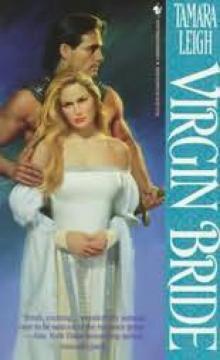 Virgin Bride
Virgin Bride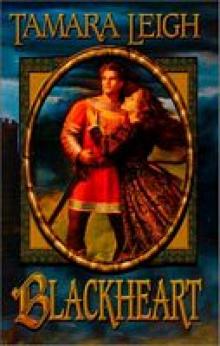 Blackheart
Blackheart Restless in Carolina
Restless in Carolina THE AWAKENING_A Medieval Romance
THE AWAKENING_A Medieval Romance Baron of Blackwood
Baron of Blackwood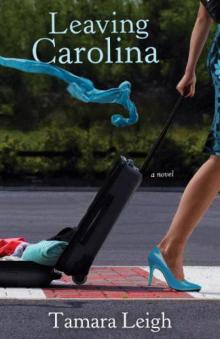 Leaving Carolina
Leaving Carolina HEARTLESS: A Medieval Romance (Age of Conquest Book 4)
HEARTLESS: A Medieval Romance (Age of Conquest Book 4)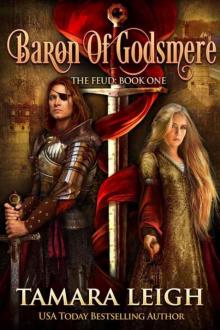 Baron of Godsmere
Baron of Godsmere Lady Of Eve
Lady Of Eve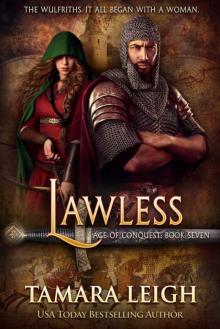 LAWLESS: A Medieval Romance (AGE OF CONQUEST Book 7)
LAWLESS: A Medieval Romance (AGE OF CONQUEST Book 7) Lady Of Fire AKA Pagan Bride
Lady Of Fire AKA Pagan Bride The Yielding (Age of Faith)
The Yielding (Age of Faith) The Redeeming: Book Three (Age of Faith)
The Redeeming: Book Three (Age of Faith)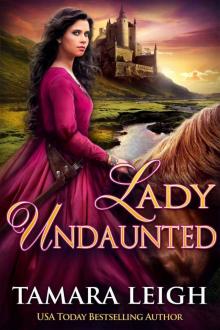 LADY UNDAUNTED: A Medieval Romance
LADY UNDAUNTED: A Medieval Romance THE RAVELING: A Medieval Romance (Age of Faith Book 8)
THE RAVELING: A Medieval Romance (Age of Faith Book 8) LADY EVER AFTER: A Medieval Time Travel Romance (Beyond Time Book 2)
LADY EVER AFTER: A Medieval Time Travel Romance (Beyond Time Book 2)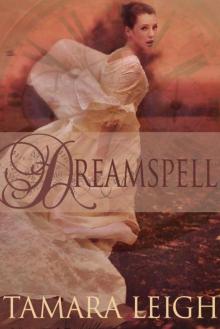 Dreamspell
Dreamspell The Unveiling (Age of Faith)
The Unveiling (Age of Faith) THE RAVELING
THE RAVELING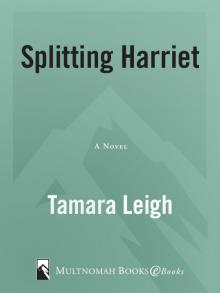 Splitting Harriet
Splitting Harriet Age of Faith 4 - The Kindling
Age of Faith 4 - The Kindling THE RAVELING_A Medieval Romance
THE RAVELING_A Medieval Romance Perfecting Kate
Perfecting Kate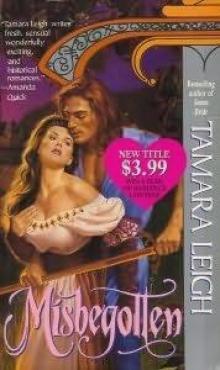 Misbegotten
Misbegotten THE VEXING: A Medieval Romance (AGE OF FAITH Book 6)
THE VEXING: A Medieval Romance (AGE OF FAITH Book 6)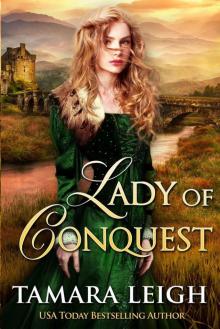 LadyOfConquest:SaxonBride
LadyOfConquest:SaxonBride